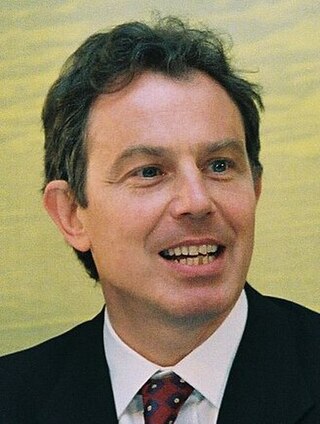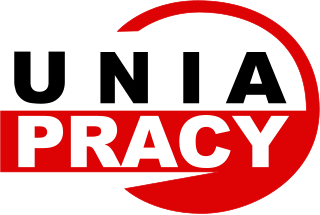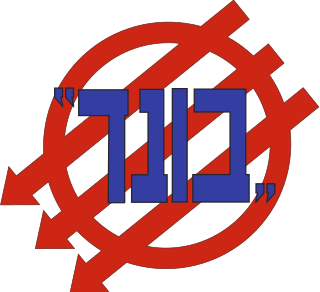
Labour Day is an annual day of celebration of the achievements of workers. It has its origins in the labour union movement, specifically the eight-hour day movement, which advocated eight hours for work, eight hours for recreation, and eight hours for rest.
Labour or labor may refer to:

The Democratic Left Alliance was a social-democratic political party in Poland. It was formed on 9 July 1991 as an electoral alliance of centre-left parties, and became a single party on 15 April 1999. It was the major coalition party in Poland between 1993 and 1997, and between 2001 and 2005, with four Prime ministers coming from the party: Józef Oleksy, Włodzimierz Cimoszewicz, Leszek Miller and Marek Belka. It then faded into opposition, overshadowed by the rise of Civic Platform and Law and Justice.

The 1997 United Kingdom general election was held on Thursday, 1 May 1997. The governing Conservative Party led by Prime Minister John Major was defeated in a landslide by the opposition Labour Party led by Tony Blair, achieving a 179-seat majority and a total of 419 seats.

Labour Union is a minor social-democratic political party in Poland. It was a member of the Party of European Socialists (PES) until April 2022.

The Social Democracy of Poland is a social-democratic political party in Poland.
Democratic Left Alliance-Labour Union was an electoral committee and a coalition of two Polish centre-left political parties: Democratic Left Alliance and Labour Union. At the national level, the alliance arose at the time of the 2001 parliamentary elections and continued through the 2004 elections to the European Parliament. The alliance came together again for the 2009 and 2014 European parliamentary elections.

Parliamentary elections were held in Poland on 23 September 2001. All 460 members of the Sejm and 100 senators of the Senate were elected. The election concluded with an overwhelming victory for the centre-left Democratic Left Alliance – Labor Union, the electoral coalition between the Democratic Left Alliance (SLD) and the Labour Union (UP), which captured 41% of the vote in the crucial lower house Sejm. The 2001 election is recognized as marking the emergence of both Civic Platform (PO) and Law and Justice (PiS) as players in Polish politics, while also witnessing the outright collapse of the Solidarity Electoral Action (AWS) and its former coalition partner, the Freedom Union (UW).

Redwatch was a British website associated with members of the far-right British People's Party. It published photographs of, and personal information about, alleged far left and anti-fascist activists. It typically targeted activists in political parties, advocacy groups, trade unions and the media. The website's slogan was "Remember places, traitors' faces, they'll all pay for their crimes", a quote from neo-Nazi musician Ian Stuart Donaldson.
The Labour Party is a political party in the United Kingdom that sits on the centre-left of the political spectrum. The party has been described as an alliance of social democrats, democratic socialists and trade unionists. It is one of two dominant political parties in the United Kingdom, along with the Conservative Party. The party has been led by Keir Starmer since 2020, who became Prime Minister of the United Kingdom in July 2024. Since the 2024 general election, the Labour Party has been the governing party of the United Kingdom and the largest political party in the House of Commons, followed by the Conservative Party and the Liberal Democrats. As of 2024, there have been seven Labour prime ministers and fourteen Labour ministries. The party traditionally holds the annual Labour Party Conference during party conference season, at which debates and voting take place, and senior Labour figures promote party policy.
Social Democratic Union may refer to:

The General Jewish Labour Bund in Poland was a Jewish socialist party in Poland which promoted the political, cultural and social autonomy of Jewish workers, sought to combat antisemitism and was generally opposed to Zionism.
Labour Party or Labor Party is a name used by many political parties.
Affiliation or affiliate may refer to:

Maurice Glasman, Baron Glasman is an English political theorist, academic, social commentator, and Labour life peer in the House of Lords. He is a senior lecturer in Political Theory at London Metropolitan University, Director of its Faith and Citizenship Programme and a columnist for the New Statesman, UnHerd, Tablet and Spiked. He is best known as a founder of Blue Labour, a term he coined in 2009.

The Social Alliance was an electoral coalition created for the 1998 Polish local elections. Formed on 27 June 1998, the Social Alliance included the Polish People's Party along with its smaller left-oriented party partners, such as the Labour Union, the National Party of Retirees and Pensioners, the Self-Defence of the Republic of Poland and few members of Alliance of Democrats (Poland). The party represented the "independent left" that challenged the anti-communist and pro-communist dichotomy of Polish politics while maintaining a strongly leftist profile inspired by pre-WW2 socialist and agrarian movements. It protested against the capitalist reforms carried out in Poland such as austerity, criticizing them for creating massive wealth inequality. Nevertheless, the coalition cooperated with the post-communist Democratic Left Alliance as well as the Polish Socialist Party.
The Labour Faction was a Polish Christian democratic political party, active from 1937 in the Second Polish Republic and later part of the Polish government in exile. Its founders and main activists were Wojciech Korfanty and Karol Popiel.

The General Jewish Labour Bund in Lithuania, Poland and Russia, generally called The Bund or the Jewish Labour Bund, was a secular Jewish socialist party initially formed in the Russian Empire and active between 1897 and 1920. In 1917, the Bund organizations in Poland seceded from the Russian Bund and created a new Polish General Jewish Labour Bund which continued to operate in Poland in the years between the two world wars. The majority faction of the Russian Bund was dissolved in 1921 and incorporated into the Communist Party. Other remnants of the Bund endured in various countries. A member of the Bund was called a Bundist.

On Sunday 26 May 2019, a vote was held to elect the Polish delegation to the European Parliament. Polish voters elected 52 MEPs, compared to 51 in the 2014 election. The increased number of MEPs is a result of the 2018 reapportionment of seats in the European Parliament. Following the United Kingdom's announcement, that it will participate in elections to the European Parliament on May 23, Poland will continue to be represented by 51 MEPs. The 52nd MEP will take up their mandate immediately after the UK leaves the European Union. Following the announcement of the election results, the National Electoral Commission indicated Dominik Tarczyński from Lesser Poland and Świętokrzyskie will take up the 52nd seat.











